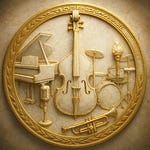Dear Colleague,
In 1959, Miles Davis gathered musicians in a New York studio. The result was Kind of Blue — arguably Jazz's most influential recording.
Today, we stand at a similar inflection point.
The Opportunity
We're selecting one institutional partner to host our inaugural fellowship residence.
Your institution would provide:
Physical space for fellows to work and perform
Access to relevant resources
Institutional credibility and support
In exchange, you receive:
Co-authorship on groundbreaking research in AI and creativity
Licensing rights to JazzGPT for educational purposes
Association with what we believe will be a landmark moment in both AI development and cultural history
Participation in the future of the Department of Jazz
The Technology
JazzGPT represents the first artificial intelligence with an emergent understanding of musical improvisation. Command "Autumn Leaves in F#" with your parameters — receive sophisticated bass lines, trumpet solos, altered changes, and exercises. Each generation is unique. Each musically literate. This isn't pattern matching. It's compositional understanding.
Early demonstrations suggest we've achieved something unprecedented: a machine that grasps the essential tension between structure and freedom that defines Jazz music.
The Institution
The Department of Jazz is establishing a fellowship program where selected artists and technologists spend a semester advancing both the technology and our understanding of creativity itself. Fellows will:
Develop JazzGPT into increasingly sophisticated domains
Create and perform hybrid human-AI musical works
Publish research on computational creativity and music
Build tools to augment the artist
We call this philosophical framework ascensionism — the elevation of human potential through technological synthesis.
The Moment
The question isn't whether AI will transform music education. It's who will lead that transformation.
Will it be technology companies that view music as content? Publishers protecting old models? Or institutions that understand Jazz as America's National Treasure and monumental contribution to the world — and see the opportunity to ensure its next chapter maintains that cultural weight?
Our board includes leaders who have influenced technology, finance, policy, and music, and we're prepared to move quickly with the right partner. The technical infrastructure exists. The vision is clear. We are identifying our institutional home that shares our ambition.
The Research Questions
Together, we'll investigate:
Can machines truly improvise, or only simulate improvisation?
How does AI collaboration change human musical cognition?
What new forms emerge when latency between idea and expression approaches zero?
How do we preserve Jazz's cultural DNA while enabling its evolution?
What is moral, legal, and ethical when it comes to the application of AI in Jazz?
These aren't just academic questions. The answers will influence and determine how creativity itself evolves in the 21st century.
Next Steps
We're speaking with a number of select institutions through October. If the Department of Jazz aligns with your institution's vision for the future of music, technology, and human innovation, I welcome 30 minutes to share our demonstrations and discuss our next steps.
JazzGPT isn't replacing musicians — it's creating a new instrument.
The Department of Jazz isn't disrupting education — it's building the institution jazz needs for its second century.
The fellowship begins Spring 2025. The future starts with one institution brave enough to host it.
Best Regards,
Kyle Benford
Founder, Department of Jazz
Contact@DepartmentOfJazz.com
(917) 740-8443
The Department of Jazz: Where human creativity and machine intelligence flourish humanity.



